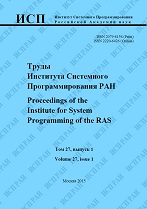|
Augmented reality when visualizing data using «golden» section properties
A. V. Voronin
The Federal Research Center «Computer Science and Control» of the RAS
Abstract:
Augmented reality, as a result of introducing into the field of perception data providing the best visualization of information, is increasingly attracting the attention of specialists in the field of software for demonstration complexes and geographic information systems. The visibility of the visualized information is important both for the work of the operator and users of the information system. Using the laws of visual perception of objects associated with the properties of the «golden» section, it is possible to formulate a visualization criterion for visualized data that characterizes the integrated perception of information displayed on the screen of a video monitor or projection panel. The purpose of the study presented in the article is to determine the visualization criterion for visualized data based on the properties of the «golden» section and study the conditions for its provision by the example of displaying of metadata on a monitor screen and projection panel. The visualization criterion is determined through the coverage coefficient of the screen area with information. The optimal value of the coefficient corresponds to the mathematical definition of the «golden» section. As a result of the study, it is necessary to highlight the analysis of the properties of the «golden» section when displaying information and the definition of the visualization criterion for data visualization, which allows operators and consumers to comprehensively perceive video data on electronic projection tools. Iterative algorithms have been developed for selecting the scale of data display by the criterion of visibility: an algorithm for analyzing the displayed layer data using an electronic map as an example and an algorithm for sequential layer analysis. The influence of the scale of the displayed data on the visibility of their visualization on screens of various sizes is investigated. The practical value of the results lies in the fact that the proposed criterion represents a mathematical interpretation of the property of the «golden» section for the visualization of information on modern electronic means of displaying data.
Keywords:
geoinformation system, electronic card, demonstrativeness of data visualization, «golden» section.
Citation:
A. V. Voronin, “Augmented reality when visualizing data using «golden» section properties”, Proceedings of ISP RAS, 32:1 (2020), 109–120
Linking options:
https://www.mathnet.ru/eng/tisp488 https://www.mathnet.ru/eng/tisp/v32/i1/p109
|

| Statistics & downloads: |
| Abstract page: | 159 | | Full-text PDF : | 71 | | References: | 29 |
|




 Contact us:
Contact us: Terms of Use
Terms of Use
 Registration to the website
Registration to the website Logotypes
Logotypes









 Citation in format
Citation in format 